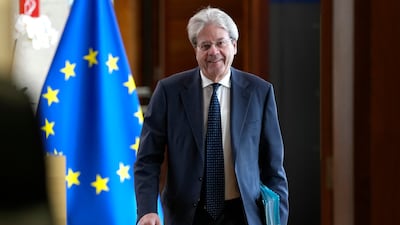The EU’s economic affairs commissioner will visit Tunisia next Monday to discuss reforms and potential financial assistance with the country's officials.
Paolo Gentiloni's visit comes only days after another European delegation visited the country.
Gert Jan Koopman, director general for neighbourhood policy and enlargement negotiations, and Johannes Luchner, deputy director general for EU Home Affairs, were in Tunis on Tuesday “to discuss and assess” the bloc’s relationship with Tunisia.
Mr Gentiloni is expected to meet Tunisian President Kais Saied, Prime Minister Najla Bouden, as well as members of the cabinet including Foreign Minister Nabil Ammar, Minister of Economy Samir Said and Minister of Finance Sihem Boughdiri Nemsia.
The EU official will also be meeting Tunisia’s Central Bank Governor, Marouane Abbassi, and representatives of the Tunisian private sector and civil society, the European Commission’s press service told journalists.
“The commissioner will discuss the socio-economic reforms envisaged by the government in the context of a difficult economic situation with Tunisian officials,” it said.
Mr Gentiloni will be also discussing with the Tunisian government “a potential new macro-financial assistance operation”, which the European Commission said it could consider if “specific preconditions are met.”
The visit comes after a meeting of the Foreign Affairs Council on Monday in Brussels, where EU Foreign Affairs chief Josep Borrell said that “the situation in Tunisia is very, very dangerous” and warned of repercussions on Europe.
“If it collapses economically or socially, then we will be in a situation where new flows of migrants will come to Europe. We have to avoid this situation,” Mr Borrell said.
Tunisia continues to face a worsening economic situation and urgently needs to enact a package of reforms to secure a deal with the International Monetary Fund.
The North African country had sought $4 billion in funding from the IMF and reached a staff-level agreement with the fund in October 2022 for a new 48-month Extended Fund Facility worth about $1.9 billion to support the government’s economic reform programme.
However, it has yet to secure funding from the international lender pending implementation of the actions required.


